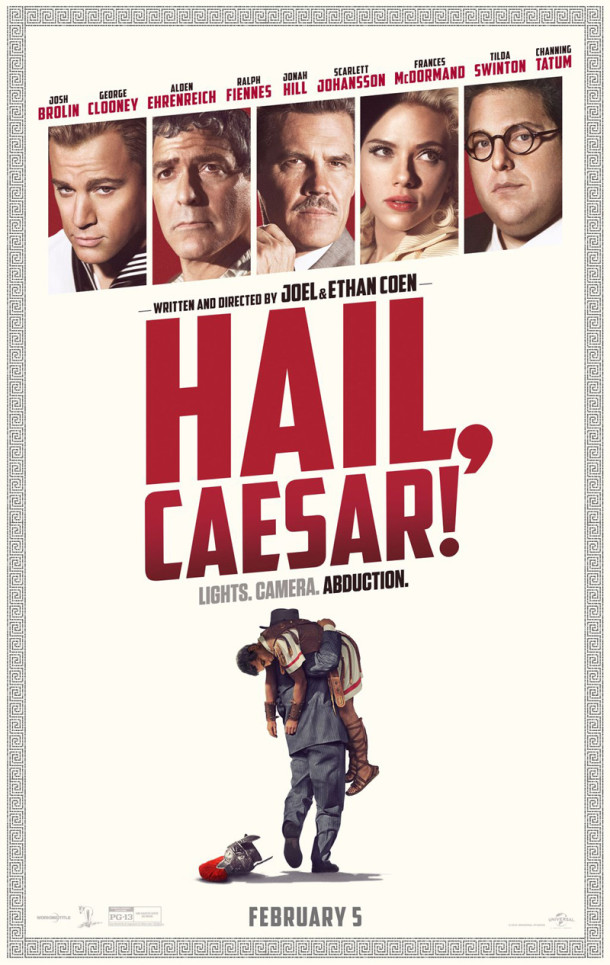 Hail, Caesar! comes to theaters with lots of buzz – it’s the first film written and directed by Joel and Ethan Coen since 2013’s Inside Llewyn Davis, it is set during the same era (and same fictional movie studio) as the Coens’ classic screenwriting movie Barton Fink, and reunites the Coens with George Clooney and Josh Brolin, two actors who had been successful in the Coen Brothers’ previous movies. While all the ingredients are here for another classic Coen Brothers movie, Hail, Caesar! is unfortunately more a miss than a hit.
Hail, Caesar! comes to theaters with lots of buzz – it’s the first film written and directed by Joel and Ethan Coen since 2013’s Inside Llewyn Davis, it is set during the same era (and same fictional movie studio) as the Coens’ classic screenwriting movie Barton Fink, and reunites the Coens with George Clooney and Josh Brolin, two actors who had been successful in the Coen Brothers’ previous movies. While all the ingredients are here for another classic Coen Brothers movie, Hail, Caesar! is unfortunately more a miss than a hit.
Set in 1951, Eddie Mannix (Brolin) is the “fixer” for Capitol Studios, which means he is responsible for ensuring the studio operates smoothly and that all the stars stay in line – and when they don’t, to find a way to make the sensational stories disappear. On one particular day, Mannix is faced with the problem that Baird Whitlock (Clooney), the star of the studio’s upcoming historical epic Hail, Caesar! A Tale of the Christ, mysteriously disappearing. As it turns out, the disappearance is a plot by Communist screenwriters, and Mannix has his hands full trying to solve the mystery while juggling the other problems of the studio.
On some level, Hail, Caesar! seems like a project that the Coens filmed during the actors’ off days. This is because stars like Ralph Fiennes, Jonah Hill, Scarlett Johansson, Frances McDormand, Tilda Swinton, Channing Tatum, Christopher Lambert, and especially Dolph Lundgren (yes, you read that correctly) only appear in minimal scenes – in some cases just one or two. Major plot points are resolved off-screen, as if the actors didn’t have enough days available to finish the film. In reality, this is really the Brolin/Clooney show with a healthy dose of Alden Ehrenreich as Hobie Doyle, a cowboy actor that the studio sees potential in. Even with limited screentime, with talent like this involved a home run should be easy, especially from the Coens. But Hail, Caesar! is far from a home run, especially considering that the Coens created one of the best movies ever made about classic Hollywood, Barton Fink. With Clooney they also made O Brother, Where Art Thou? and with Brolin they made No Country for Old Men. These are all great films – but Hail, Caesar! feels like bits left over from these better ideas. It’s a funny film, and there are some hilarious sequences (a scene in which Mannix consults with four religious leaders about the script for Hail, Caesar is an early highlight), but this isn’t the Coens at their best.
Brolin is the lead and the best aspect of the film, and Mannix weighs an important decision about his future with Capitol Studios throughout the film (it’s worth noting that Brolin’s family-orientated Mannix bears very little in common with real-life MGM fixer Eddie Mannix). This decision and other aspects tie the film to many of the major historical events that would come later in the 1950s – the nuclear arms race, the Hollywood blacklist, the decline of cowboy movies in favor of science fiction movies, the rise of television, and the end of the studio system. The Coens tap at these issues, but they seem to think the audience would rather laugh at a bumbling Clooney than explore the rich texture of the seedy side of Hollywood in 1951 and the changing pop culture of America. But they bet on the wrong horse here.
Undoubtedly, the Coens can and will do better with future films, and it’s not like Hail, Caesar! doesn’t have its moments. But it’s ultimately a disappointing film by a filmmaking team that rarely disappoints.
















Recent Comments